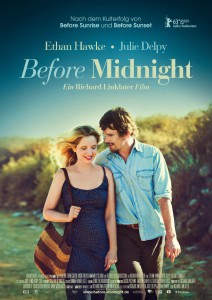I went to watch Before Midnight on Friday evening, having timed my drive to the Landmark Theater in what I thought was a spectacularly smart manner. Traffic was brisk, and I made it 15 minutes before the screening. Except the parking at the mall was full on all levels but one, and by the time I reached Level 5, there was a stream of disappointed drivers heading out because apparently the “but one” part was no longer valid. I sniffed around awhile, checking to see if anyone was leaving, but then it was 7:15 and I knew if I stayed for the 9:45 show, the evening was done. So I went back home, and read Fullmetal Alchemist until my eyes bled. You know the rest.
I went there again yesterday, and this time things were much more uncomplicated. By the time the movie began, I was done with half the first volume of Detroit Metal City, and the theater was decently full for a Monday evening.
I won’t talk about the movie. You wait for some things for a long time, you read tidbits of meta-data here and there, do your best to avoid spoilers, and you place your trust in the makers. You are in the right frame of mind to take the movie in, you are pretty pumped about the 96 meta-score. Yes, it feels good to have your trust rewarded. The movie made me laugh, and gasp, and laugh some more. It made me hold the arms of my (very well-positioned) seat tight every now and then. I occasionally smiled to myself when a phrase here or a retort there caused some half-forgotten memory to resurface. And once it was done, the last of the credits had faded on the screen and I blinked at the lights coming on, I realized I was thinking about time and death, and love. And also about Julie Delpy’s beautiful breasts, that make a non-cameo appearance in the second half of the movie.
But my most enduring memory of Before Midnight will be this: there is a bit of dialogue in there, when Celine is telling Jesse about how predictable it is to have sex with him. “Kiss kiss kiss, tits tits tits, pussy, snore”, she says, and makes a face. But naturally, the theater is in uproar, with full-throated laughter everywhere. Especially from this really old gentleman sitting behind me, who is loudly guffawing. And then his wife, who was also choking back her laughter, turns to him and says – “You of all people should not be laughing at that!”
That makes me turn around and look at them, at which they both look at me and laugh even harder. So do I.

